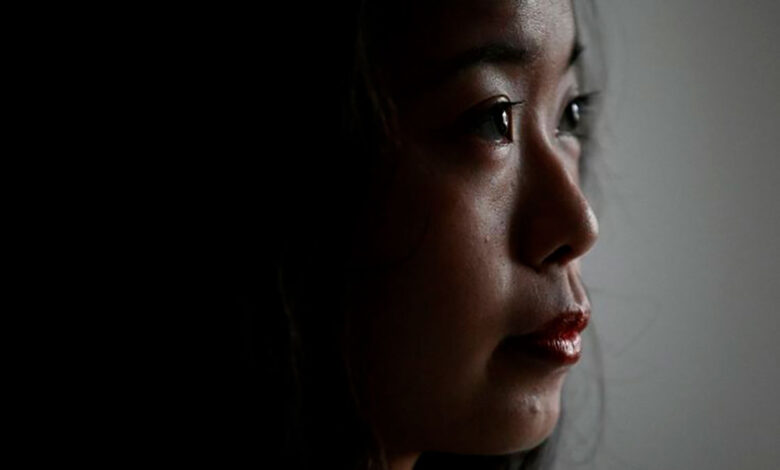Xianzi, the symbolic woman of the #MeToo that they are trying to silence in China

Xianzi sounds exhausted. “Sorry. I’ve been crying for the last half hour, ”he tells the BBC by phone from Beijing.
It is the day after a court dismissed for “lack of evidence” the historical case of sexual harassment of the Chinese activist against one of the most important celebrities in the country, which has made her the face of China’s fledgling #MeToo movement.
Hit a dead end, feel.
Before our call, Xianzi had tried to contact a supporter through Weibo, the Twitter-like social media platform where the 28-year-old has a tight-knit support group.
But both she and her sympathizer had been blocked on Weibo after the court hearing. Realizing that she was isolated from her online community, she burst into tears.
“Accounts are constantly suspended. There is no way to communicate. The last three years have been separating Chinese feminists from each other. “
A growing repression
In 2018, when #MeToo became popular in China, Xianzi – whose real name is Zhou Xiaoxuan, but is better known by her pseudonym – was one of many women who they began to share stories of sexual harassment.
In a 3,000-word essay that went viral, she accused Zhu Jun, a host for the state broadcaster CCTV, of sexually harassing her in 2014 when he visited her dressing room in hopes of interviewing her.
At the time, she was a 21-year-old intern, while Zhu was famous in China, a familiar face to tens of millions for hosting the annual Spring Festival Gala television event.
In a later trial she presented more details, accusing him of repeatedly touching her for about 50 minutes, despite his attempts to prevent it, and of forcibly kissing her.

Their interaction was interrupted multiple times by staff briefly entering and exiting the room, but she described being so frozen with fear and shame that she was unable to alert them. He said that he only left the room when Zhu got distracted while talking to someone, which allowed him to “regain consciousness“.
Zhu has consistently denied all the allegations. He has said that he is the victim of a smear campaign and that he has endured “tremendous humiliation”.
The day after that encounter, Xianzi reported the incident to the police.
But according to her, they told her to shut up, since Zhu was a national example of “positive energy”, a state campaign designed to promote good behavior, and therefore someone whose reputation could not be tarnished.
He obeyed, until the #MeToo movement came along.

The case gained even more notoriety after Zhu sued her for defamation. She countersued him for “violation of personality rights”, using a law that at the time was the closest thing to discrimination against sexual harassment.
Since then, Xianzi’s life has changed.
Born into a middle-class family in Wuhan, she moved to Beijing to study film directing when she was 18 years old and working as a screenwriter.
She has since resigned, and for the past three years she has been living off her savings and sporadic income from freelance writing jobs. Your attorney is only charging you a minimal fee.
Xianzi has focused on fighting his legal battle and campaigning for victims of sexual harassment, many of whom they have approached her for advice, on his social media accounts, where he has earned more than 300,000 followers.
At the same time, the authorities’ efforts to censor her have intensified, shutting down discussions and banning her from posting on Weibo. Even the phrase “rice rabbit”, a Chinese namesake of the #MeToo campaign, has been removed from Chinese social media.

At first, she circumvented censorship by passing her essays on to followers who posted them on their accounts on her behalf. But then those accounts were also suspended.
Xianzi has also increasingly become a target of criticism, with some nationalist bloggers accusing her of lying and claiming that he was “in collusion with foreign forces” to provoke controversies. This week, a comment on his case in the state-run Global Times newspaper claimed that Western forces were using the #MeToo movement to “tear apart Chinese society.”
Then there are the legal setbacks. According to Xianzi, the court rejected his request to label the case a sexual harassment lawsuit after a new court rule took effect.
He also said that during the trial, the court gave him little opportunity to speak and blocked his efforts to present supporting evidence, such as video footage of the area outside the locker room and a photo of his encounter with Mr. Zhu.
In 2014, she turned in a trial, a dress that she had worn on the day of her meeting with Zhu. The initial examination found no traces of his DNA. And when she asked for a more in-depth examination, she said she was told in court that the dress was “nowhere to be found.”
He said the court also told him that it was “unnecessary” to force Zhu to testify.

China’s legal expert Darius Longarino told the BBC that he considers the court’s reasoning to be “unconvincing.”
Some in China believe that there was political motivations behind these court decisions.
On top of all this, Xianzi still has to deal with Zhu’s defamation lawsuit against him, in which he demands 650,000 RMB (US $ 100,000) as compensation.
The BBC has tried to contact Zhu and his lawyers, but has not received a response.
All of this has taken its toll on Xianzi. In a video shared by supporters last week, she appears dejected while speaking to them shortly after leaving the courtroom in Beijing.
“Twas 21 when the incident occurred. Now I’m 28, I’m so tired … I do not know if I have the courage to fight another three years“, He says.

Her activist friends, family and boyfriend have been vital in providing emotional support, she told the BBC.
But the most effective therapy for her has been talking with friends and through her rehearsals. “Talking is healing,” he says, which is why the growing censorship has been painful.
“If people are forbidden to say that they are injured, then they are really trying to destroy them,” Xianzi says. “I don’t understand what I did wrong. Why do you want to destroy me? “
A heavy load
Xianzi’s case is the second high-profile in recent weeks to be stopped.
In early September, prosecutors dropped charges against an employee of tech giant Alibaba who had been accused of raping a colleague on a work trip while she was drunk, despite police investigations finding the man had “Committed indecencies”.
The man was fired from Alibaba and detained for 15 days.
Only a few cases of sexual harassment have reached the courts in China. According to legal experts, a high level of evidence, which tends to require video recordings or photographs of the actual incident, places a heavy burden of proof on plaintiffs to prove their case.
“LVictims feel they have no choice but to approach the public, which reflects the failure of these institutions to address complaints. A victim shouldn’t need to post their experience on Weibo for their employer to pay attention to them, ”says Aaron Halegua. Researcher at the New York University School of Law.
But doing so puts them at risk of being sued for defamation by their alleged stalkers, and studies of such cases show that they very often lose.
In January, a new civil code came into force in China, containing Article 1,010 which clearly specifies that a person can sue if they have been sexually harassed, and that institutions and organizations must take measures to prevent such behavior and investigate cases.
When it was introduced last year, it was announced as a win. But with those who make sexual assault or harassment accusations facing a different reality, the legal system is sending a “mixed message,” says Longarino, an academic researcher at Yale Law School.
“There are many more disadvantages than advantages in to sue, which creates a chilling effect, “he adds.
“Together we persist”
The outcome of the Xianzi case has been an obvious setback for China’s #MeToo movement, activists say. Some see it as a bitter illustration of the growing difficulties that alleged victims face.
Activist Liang Xiaowen tells the BBC that a 300-member feminist group on the Wechat chat app was silenced shortly after Xianzi’s trial. Members could still post to chat, but couldn’t see other’s messages. “You are isolated, but you don’t even realize it”says Liang.
The silver lining in Xianzi’s case has been her legacy, as it has significantly raised awareness of women’s rights in China.
“#MeToo is important because of its rebellion, it is one of the last few significant voices that is still expressed in China,” says veteran feminist Lu Pin. “And it can’t go away, because it is derived from the real lived experiences of Chinese women ”.
Xianzi says he believes his case has made “progress” in the fight for justice.
Together we persist. That is already a victory, ”he says with determination.
“Never I have thought that it is not worth the sorrow [todo el esfuerzo]. Not for a second “.
Remember that you can receive notifications from BBC Mundo. Download the new version of our app and activate them so you don’t miss out on our best content.
.



